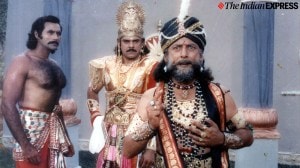Stay updated with the latest - Click here to follow us on Instagram
‘Snowflakes’ are cold as ice
In Errol Morris’s film, Donald Rumsfeld manages to remain the known unknown.
Errol Morris recalls that when he first met Donald H Rumsfeld, he asked that former defense secretary for President George W Bush what he thought of The Fog of War, Morris’s 2003 Oscar-winning documentary about Robert S McNamara, another towering Pentagon chief toppled by a misguided war.
Rumsfeld said that he disliked it because McNamara, who spent much of the film regretting past mistakes, had nothing to apologise for.
In short, a film about this man wasn’t likely to reveal any deep, dark secrets. Instead, Morris decided to focus on the memos that Rumsfeld wrote — “snowflakes”, they were called, because he blanketed his staff with thousands, like blizzards of white paper — as a Rosetta stone to his subject’s character.
The resulting film, The Unknown Known, is structured much like The Fog of War. For 96 minutes (out of 34 hours of conversation), Rumsfeld looks into the camera, answering, or finessing, questions about Iraq, his work for several presidents, the nature of truth and more.
The goal, Morris said in a phone interview in late November, was “to tell history from the inside out, not from the outside in”, to explore “how Donald Rumsfeld sees himself and accounts for himself”.
Yet this technique has its limits when confronting a figure so practised in evasion and so averse to introspection.
McNamara was 85 when The Fog of War was made, but he was still sharp, and eager to recite the lessons he’d learned. He was deceptive, or at best forgetful, about the Vietnam War and the Cuban missile crisis, recounting his role as more dovish than the archives indicate. But the film was a fascinating, almost tragic portrait of a man still lost in the fog, grappling with his legacy.
No one could expect Rumsfeld, now 81, to engage in self-criticism. Still, some of his replies are so vapid that it’s hard to tell whether he’s slippery or shallow. Asked whether invading Iraq was a mistake, Rumsfeld plaintively says, “I guess time will tell.”
The film’s title comes from Rumsfeld’s famous memo of February 4, 2002, in which he wrote, “There are known knowns, known unknowns, and unknown unknowns”, adding in a less-famous passage, “There are also unknown knowns: things you think you know that it turns out you did not.”
Parsing documents is Morris’s specialty. His posts for the Opinionator blog of The New York Times, analysing which of two slightly different Crimean War photos had been altered and why, were a tour de force of intellectual detective work. So were his probings of the court records for murder cases against Jeffrey MacDonald, in his 2012 book A Wilderness of Error, and Randall Adams, in the 1988 film The Thin Blue Line. (The latter led to the reversal of Adams’s conviction.)
But Rumsfeld’s snowflakes obscure more than clarify, in many cases, deliberately. For instance, one scene in the film shows a news conference at which Rumsfeld recited his “unknown unknowns” memo as a way of deflecting questions about whether Saddam Hussein had weapons of mass destruction. A few times during the film, Morris catches his subject in a direct contradiction and holds the camera on his face, hoping to see him squirm, but Rumsfeld stares right back.
“Almost all of his answers are designed to deflect and manipulate,” Morris said in the phone conversation. “But I think he’s also manipulating himself. Any account of him has to deal with the gobbledygook, the lies, the glibness, the cleverness — but also his emptiness.”
If this take on Rumsfeld is true — if his evasions indicate nothing deeper than “an absence of thought”, as Morris put it — then one has to wonder whether he’s worth the attention. But is it true? This is a man, after all, who spent decades climbing the rungs of power in Washington, shoving rivals aside with Machiavellian glee. (Look at his mischievous smile in the scene where he mentions his bureaucratic pummeling of George H W Bush in the 1970s.) Henry A Kissinger, who knows whereof he speaks on such matters, once referred to Rumsfeld as “the most ruthless man I ever met”.
In other words, there may be less to these snowflakes than a close reader like Morris is inclined to assume. In one scene, when he asks about the fine points of a memo’s wording, Rumsfeld himself says, “I think you’re probably chasing the wrong rabbit here.”
A key difference between The Unknown Known and The Fog of War is that McNamara was an emblematic figure of his time, the arc of his career tracing the rise and fall of post-war American power. Rumsfeld’s career has been long and storied, but it has no great theme — or none that he seems willing to share or contemplate.





- 01
- 02
- 03
- 04
- 05


























